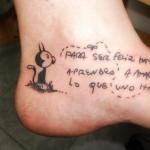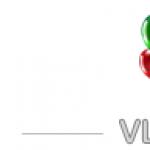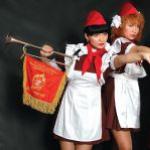Speech development through spiritual and moral education. "spiritual and moral education of children through reading fiction"
MBDOU "CHERLAKI KINDERGARTEN No. 9 combined type"
"SOCIO-MORAL
EDUCATION THROUGH SPEECH DEVELOPMENT.”
CONDUCTED BY: TEACHER SHIKHOVA N.YU.
Software tasks:
To develop children’s ability to determine people’s moods based on a schematic image of their eyes.
Develop a dialogical form of speech, stimulating children’s own statements, which are the basis of cognitive communication; develop the ability to coordinate adjectives with nouns in gender, number, and case.
Expand children's knowledge about the benefits and harms of health.
To consolidate knowledge about age and gender characteristics in a person’s appearance.
Cultivate interest in your own personality.
Material: doll, screen, telephone, microphone, easel, markers (2 packs). Tape recording: “Attention! Wanted!
Progress of the lesson:
A recording sounds: “Attention! Boy wanted! Special features: red hair, blue eyes. Dressed: red shirt with polka dots, blue pants. The finder or the one who saw him is asked to call: 2-5-5, repeat phone 2-5-5.”
Educator: Guys, look, isn’t there such a thing among us? (children examine and compare). (The teacher draws attention to the doll.) - So here he is, look, does he look like the one they are looking for? (children's reasoning)
The teacher turns to the doll.
Playback: Are you lost?
Kuzya: No, I just came to visit you. Hello! (children say hello)
Vosp.: What is your name?
Kuzya: My name is Kuzya. And you?
Vosp.: My name is Natalya Yuryevna.
Kuzya: Very nice.
Vosp.: Do you want to meet the guys?
Vosp.: What is your name? (asks several children)
Kuzya: You are all so alike that I cannot distinguish you and remember you.
Vosp.: No, Kuzya, you are mistaken, all people are different and we will tell you now
let's prove it. Guys, let's play the game: “We are different”
(children stand up, teacher names the child). Look and tell me which of the guys
the highest, the lowest.
Who blonde hair(step forward).
Who dark hair? (2 steps forward)
Who has rubber bands on their heads? (raise hands) - Who has buttons on their clothes? (hands forward)
Who has red in their clothes (sit on the chairs).
Vosp.: Now, Kuzya, you see that every person has something that others do not have. Kuzya: Yes, of course!
Vosp.: Therefore, all people are different. Do you know how people are similar to each other? Kuzya: No!
Vosp.: Do you guys know? (legs, arms, face, etc.) But if you look closely, these parts of the body differ from each other in different ways. For example, eye color. What color are eyes? (children's answers: blue, green, brown). Brown eyes are called hazel. – That’s right, eyes not only come in different colors, but also express mood (card on the board). - Look at the board, what is it? (children: eyes)
Look at the first pair of eyes (second, etc.). What mood do they convey?
Children: sad, happy, angry, surprised.
Vosp.: Kuzya, you know, when we look into each other’s eyes, we can see that the person is tired, happy, sad.
Vosp.: Why are we crying?
Kuzya: I know when it hurts me I I'm crying.
Vosp.: And when else?
Children: sad, painful, happy, etc.
Recall: There are tears of joy and tears of sadness. When a person cries, it is
good or bad? (children's assumptions)
Vosp.: This is good, because tears cleanse the eyes!
What can damage your vision?
Children express their guesses.
Kuzya: How interesting, you have to remember everything! But I know something interesting
poem.
Slap, splash on the lawn
They don't see anything!
Vosp.: Oh, what an interesting poem! Let's repeat it.
(Children get to their feet, imitate movements in accordance with
poem).
Vosp.: By the way, people’s noses, Kuzya, are also different. Look.
(Draws attention to the diagram on the board).
What are the shapes of noses?
Children: long, short, sharp, with a hump, snub nose.
Vosp.: Kuzya, do you know what the nose is for?
Kuzya: To keep glasses.
Vosp.: Guys, do you know?
(children's answers)
Playback: Correct, for detecting smell, inhaling air and
plays an important role in communicating with each other.
What kind of nose does the arrogant one have in Kuzin’s poem?
(children's answers)
Why is it bad to turn up your nose?
Kuzya, do you know what you need to have in your pocket so that your nose is always there?
Kuzya: No.
Children: handkerchief.
Vosp.: Guys, what other parts of the face can you name?
(game suggested: “Draw a portrait”: 2 teams, one draws a boy,
the other is a girl. At the teacher’s command: 1st – nose, 2nd – eyes, etc.).
Playback: Kuzya, check it out.
Let's give them names.
Kuzya: Can I name them? (gives names)
Playback: There are also boys and girls in our group.
Kuzya: I I would like to get to know the guys better, can I borrow from them?
interview?
Play: (picks up a doll with a microphone) Come on, Kuzya, ask questions, and
the guys will answer.
Are you a boy or a girl?
How old are you?
Who do you look like?
Are you a granddaughter or grandson?
Whose granddaughter are you?
What will they call you when you grow up?
And you? (2-3 children).
What will you do if you don't have a friend nearby?
Kuzya: I really want to have friends. Can I be your friend?
Vosp.: Guys, we played with Kuzya so much that we forgot, because someone is looking for him.
Do you remember the phone number? Let's call (child calls).
Kuzya thanks the guys for learning a lot from them.
Vosp.: And you come to visit us again, but just let your mother bring you
Ksenia Mednikova
Spiritually moral education preschoolers in a speech center
Slide Speech
1 Good afternoon, dear colleagues!
Today I want to bring to your attention my presentation at topic: « Spiritual and moral education of preschool children in a speech center».
2 At the present stage of development of education spiritual and moral education is one of the most important tasks in education the younger generation. - pedagogical process of assimilation and acceptance pupils basic national values, mastering the system of universal human values of the multinational people of the Russian Federation.
3 Spiritual and moral upbringing is a broad concept that consists of a number of components: morality, patriotism, citizenship.
Morality is internal morality, taking responsibility for one’s actions, that is, acting according to one’s conscience.
Patriotism is love for family, home, native places, the Motherland, pride in one’s people, a tolerant attitude towards other people, the desire to preserve and increase the wealth of one’s country.
Citizenship is the highest level of development of the moral consciousness of society.
4 Spiritual and moral education is one of the most important tasks of both general and special pedagogy. It is equally necessary for children with normal speech development and children with speech disorders. However, the presence of certain psychophysical characteristics in children with speech impairments in some cases greatly complicates the formation of moral personality traits in them.
5 In the content of the correctional system of work with children with speech disorders, I necessarily, at each lesson, set myself tasks that allow us to effectively implement the targets laid down in the Law on Education of the Russian Federation, Federal State Educational Standards preschool education (FSES DO, “Concepts spiritually-moral development and education personality of a citizen of Russia”, adapted to the MADOU program, the program of Filicheva T. B. and Chirkina G. In “Correctional development and education of preschool children with FFN and OHP».
6 Since children with speech impairments have predominantly visual-figurative thinking, it is necessary to saturate the surrounding reality with objects and aids that allow children to more accurately imagine what they are being told about. On logopunkt and in groups a developing subject-spatial environment has been created containing material on familiarization with one’s hometown, country, state symbols (coat of arms, flag, anthem, portrait of the President of Russia, the historical past of Russia, as well as material on spiritual and moral education of children(photos depicting temples, fiction on folklore - fairy tales, epics, legends).
7 Upbringing patriotism is impossible without acquaintance with history and Russian culture, which is carried out at speech therapy classes in the process of learning by children those: "Dishes", "Furniture", "Cloth", "Shoes", "Our Army". As children explore these topics, they not only expand their vocabulary with modern words, but also learn older words. This leads not only to the accumulation of a nominative vocabulary, but also a vocabulary of features.
8 An integral part speech therapy work in kindergarten is to familiarize children with their native language, folklore, instilling a love for native speech. Examples of the native language are very clearly presented in fiction, especially in works of oral folk art (fairy tales, poems, songs, proverbs, sayings, etc.).On speech therapy In our classes we teach the children proverbs and sayings, tongue twisters and tongue twisters.
9 It is known that fairy tales carry great potential for positive moral teachings. Fairy tales teach children to follow the commandments given to man by God, to live in harmony with themselves and the world. Therefore, in the process correctional work I conduct fairy tale quizzes, we dramatize and create fairy tales. Analysis of fairy tale situations and characters’ characters together with children contributes to the formation of skills correct behavior in certain situations. Children listen to, tell Russian folk tales and stories, learn to retell and analyze them.
10 In section "Coherent speech" And "Development of lexical and grammatical categories" Exercises and assignments, varied in form and content, about the Motherland, about the defenders of the Russian Earth, about preserving peace in their country and throughout the world are presented. Through texts, children become acquainted with the national values of our fatherland, ancient monuments and their creators, and the exploits of domestic heroes during the Second World War.
11 Studying on speech therapy various activities lexical topics related to nature "Vegetables", "Fruits", "Seasons", "Wintering Birds", "Migratory birds", "Animals", "Trees", "Flowers", children get acquainted with the nature of our region, learn how rich and interesting it is, learn that it needs to be protected, and also decide purely speech therapy tasks to consolidate relative and possessive adjectives, singular and plural nouns and adjectives, prepositions, children learn to form diminutive nouns, compose and retell stories.
12 The main task of teacher interaction is speech therapist with teachers and specialists is to create optimal conditions, promoting correction and full disclosure of the potential speech abilities of children. In this case, one cannot fail to note the holidays that are held during the school year. of the year: "Victory Day", "Defenders of the Fatherland Day", "Christmas", "Winter farewell" etc. In preparation for the holidays, children learn poems, songs, and roles. Holidays in kindergarten are effective remedy aesthetic impact on the younger generation
13 Important a condition for the moral education of a preschooler with speech pathology is the family's attitude to this problem. It is in the family that the foundations of patriotism are laid spiritually-moral values, family traditions, mutual relationships with everyone. In this regard, the work takes on special significance speech therapist with parents, since it is the family that is the basis in which the moral qualities of the child are formed, which are so necessary when correcting speech deficiencies. To more actively involve parents in educational process , we provide consultations, master classes, we lead speech therapy corners.
14 Summarizing the above, we can say that in an organization organized in a certain way speech therapy there is always room for work spiritual enrichment of children, the formation of high moral qualities in them, the formation of a sense of patriotism, pride in their land, their Motherland
15 Information sources:
Molchanova E. G., Kretova M. A. “Speech development of children 5-7 years old in logopunkt» : Publishing House TC Sfera 2015.
Feoktistova T.K. Shestyakova N.P. « Spiritual and moral education of preschool children» : Publishing house "VLADOS" 2012.
Kairova I. A. Bogdanovap O. S. "The ABC of Moral education» :
Teacher's Manual\ M: Enlightenment 1997.
Malova V.V. “Lesson notes on spiritual and moral education of preschool children on the material of Russian folk culture": A manual for teachers of secondary education \ "VLADOS" 2014.
Internet resources.
16 Thank you for your attention!
Municipal preschool educational institution
kindergarten No. 19 Rzhev
Report on the topic:
“Spiritual and moral education of preschool children through speech development”
teacher speech therapist
Makhova Elena Viktorovna
Rzhev
2017
“It is difficult to disagree with those who claim
that without Christianity, the Orthodox faith,
without the culture that arose on their basis it is unlikely
Russia would have taken place. That's why it's important to come back
to these primary sources when we reacquire
ourselves, looking for the moral foundations of life"
V.Putin
a kind person out of the good treasure of his heart he brings forth good, and an evil man brings out evil from the evil treasure of his heart, for out of the abundance of his heart his mouth speaks.
Without patriotism there is neither a state nor a people... Patriotism is a spiritual phenomenon, it is also associated with spiritual traditions. You cannot call for patriotism. It is necessary to slowly and seriously cultivate the spiritual principle in a person.
The harmonious development of a child is the basis for the formation of a future personality. It depends on the successful solution of many educational tasks, among which issues of morality and aesthetic education. Concepts of ethics and aesthetics in pedagogical process always closely interconnected.
Indeed, it is impossible to teach a child the truth and goodness without developing in him the concepts of “beautiful” and “ugly”, “real” and false; goodness in nature and people.
Spiritual and moral education of preschool children allows them to correctly form a worldview, civil position, family values and moral guidelines. Modern classes in the spiritual and moral education of preschoolers are based on Orthodox pedagogy, which contains spiritual and moral components necessary for the spiritual development of society and the state.
Education of the soul (i.e. spiritual and moral education) is a continuous process, it begins with the birth of a person and continues throughout life; this is a very broad concept that consists of components: morality, patriotism, citizenship.It is gratifying that at the present time, when the process of spiritual revival of Russia begins, on January 1, 2014, theGEF DO , which consolidates the priority of spiritual and moral education of preschool children.
So inGeneral provisions noted thatOne of the main principles of preschool education is the familiarization of children with sociocultural norms, traditions of the family, society and state.
It's no secret that currently the number of children with speech disorders is increasing. In the structure of the defect in children with speech pathology, there is a decrease not only in the level of speech development, but also a decrease in the level of the cognitive sphere, which also leads in some cases to difficulty in instilling spiritual and moral standards in them.
Taking into account all the features of the development of thinking in children with speech disorders, at the speech therapy center and in groups at our preschool institution we pay great attention to creating a diverse subject-spatial environment that contains materials on local history, familiarization with the native country, state symbols, the historical past of Russia, work is organized according to the folk calendar, selected didactic games, illustrations, thematic folders depicting the family, family photo albums. The feeling of patriotism is multifaceted in its content. It is important to show your child that motherland The city is famous for its history, traditions, sights, and monuments.
The education of patriotism is varied in its content; it runs like a red thread in my work in the process of studying lexical topics, the formation of correct grammatical structure speech and development of the child’s connected speech skills.
In connection with the implementation of the Federal State Educational Standard for preschool education, teachers, and in particular I, are looking for new approaches and ideas in our teaching activities.
Traditional education is being replaced by productive learning, which is aimed at developing creative abilities and developing interest in creative activities in preschoolers.
Every nation has its own fairy tales and they are allindulge from generation to generation moral values, kindness, friendship, mutual assistance, hard work. Works of oral folk art not only form a love for the traditions of their people, but also contribute to the development of personality in the spirit of patriotism. I have selected literature on folklore - fairy tales, songs, epics,legends . A card index of proverbs, pure sayings, tongue twisters about family, friendship, good and evil, work, Motherland, courage, courage has been compiled.
It is known that fairy tales carry great potential for positive moral teachings. Fairy tales teach children to follow the commandments given to man by God, to live in harmony with themselves and the world. Therefore, in the process of my correctional work, I pay great attention to familiarizing children with fairy tales. Except directly speech therapy sessions, I conduct short-term pedagogical projects, during which I introduce children to Russian traditions and customs.
One of the promising methods to help solve this problem is the lapbook. A laptop is a collective image of a poster, book and handout that teaches you to think and act creatively within the framework of a given topic, expanding not only your horizons, but also developing the skills necessary to overcome difficulties and solve the problem. While studying this new direction, I came to the conclusion that a lapbook is a great way to reinforce a certain topic with children, comprehend the contents of the book, conduct research work, during which the child participates in searching, analyzing and sorting information.
Today I want to present to your attention an interactive thematic folder with elements of theatrical activity Lapbook “Visiting a Fairy Tale”. It includes a set of games and tasks aimed at developing coherent speech, fine motor skills, memory, attention, logical thinking, imagination, observation, and a table screen for organizing theatrical activities.
This manual allowed me and my parents and children to organize pleasant and fabulous gatherings together, where children listen to and tell Russian folk tales and stories, learn to retell them, compose and analyze fairy-tale situations and characters, which contributes to the formation of the ability to behave correctly in certain situations. situations.I am sure that my children can draw conclusions that good is rewarded to those who live following moral laws, that is, do good, do not do evil: “Thou shalt not kill,” “Honor father and mother,” “Don’t lie,” “Don’t envy.” "
It is impossible to imagine spiritual and moral education without a variety of theatrical and musical festivals and entertainment. In our preschool institution we introduce children to national holidays and festivities (“Christmas”, “Maslenitsa”, “Easter”, “Victory Day”, etc.). In preparation for the holidays, we teach poems, songs, and roles with children.
We look at albums with images of elegant costumes, admire dolls in national costumes. We talk about work folk craftsmen help children understand how pleasant it is to make beautiful and necessary things for people, to please their loved ones, relatives and friends.
Families and kindergarten are two priority places where the full formation of a person as an individual takes place. Family is the key to a child’s spiritual upbringing
In my correctional and speech therapy work, I involve parents in activities that promote joint activities from children. Widely apply both group and customized forms working with parents:
conversations; consultations: “Nurturing independence and responsibility”, “How to organize children’s work at home”; joint competitions: “Gifts of Autumn”, “My Herbarium” crafts from natural material, crafts from vegetables, seasonal exhibitions of joint works " New Year's toys»; collaborations children and parents on the topics: “My family”, “How I spent the summer”. We make photo albums, which the children then constantly refer to and show each other photographs of their family. Children share their impressions, learn to listen to each other, and show interest in their interlocutor. In collaboration with parents pedagogical project Together with teachers, I organize children’s and parent’s holidays, master classes “Hurray the sound is born”, “Pure River” seminars and workshops. The main goal of these events is the correction of speech deficiencies as well as the cultivation of love for one’s loved ones and family.
At the end of my speech, I want to summarize that in speech therapy work organized in a certain way, there will always be a place for the spiritual enrichment of children, the formation of high moral qualities in them, the formation of a sense of patriotism, pride in their land, their Motherland.
Very often children are compared to a flower. And we teachers watch how a little man grows, how a flower emerges from a tiny bud over time, we don’t know exactly what it will be like, we can only dream. And how proud we are when we see what wonderful people our students grow up to be.
Dear colleagues I would like to end my report with the words of the wonderful teacher Anton Semenovich Makarenko “Our children are our old age. Proper education this is our happy old age, bad upbringing is our future grief, these are our tears. This is our fault before other people.” Let's remember this. Thank you for your attention
Linguistic education should begin in the first years of a child’s life and be carried out exclusively in the native language.
Here is what K. D. Ushinsky wrote about the power of the folk word: “A child does not only learn conventional sounds when studying his native language, but drinks spiritual life and strength from birthmark breast native word."
Process improvement idea moral education is inextricably linked with the idea of a child assimilating cultural and historical experience in the system different types activities and, above all, in those types of activities that are leading for a given age.
Humanization and democratization of spheres of life modern society could not but affect the structuring of preschool education. Variable training and education programs have appeared, where the mental education of a preschool child has become a priority. Today's preschool graduate can read, write and count, but at the same time he has a low level of culture verbal communication.
Currently, in language practice there is a loss of the best speech traditions, which entails the decline of general culture. In speech activity, this is expressed in an increase in vocabulary with a reduced emotional-expressive coloring, colloquial forms, vulgarisms, and jargon. Mastery of the richness of the literary language, skillful use of it visual arts in various communication situations they determine the level of a person’s speech competence and are indicators of his general culture.
The culture of verbal communication presupposes not only the ability to speak correctly, expressively and accurately, but also the ability to listen and extract the information that the speaker has put into his speech.
A high level of communication culture is the main condition for a person’s successful adaptation in any social environment. In this regard, in the modern education system, the problem of developing a culture of verbal communication among children is once again becoming particularly relevant. preschool age. As is known, it is during this period that the foundation of moral principles and moral culture is laid, the emotional-volitional sphere of the personality develops, and the productive experience of everyday communication is formed.
At the present stage, the search for new forms and methods of teaching children is one of the pressing issues of pedagogy. Increased attention to the development of a child’s personality is associated with the possibility of updating and qualitatively improving the system of his speech development. Along with the search for modern models of education, it is necessary to revive best samples folk pedagogy. Folklore, as a treasury of the Russian people, finds its application in various areas of work with preschool children.
Children's folklore- This is a special part of folk culture that plays an important role in the life of every nation. are important in the formation and development of the personality of every newly born person, in their assimilation of the cultural riches of previous generations. They are necessary for a child to express in artistic form his special vision of the world, generated by age-related mental characteristics.
By using children's folklore An adult easily establishes emotional contact and emotional communication with a child. Interesting content, rich imagination, vivid artistic images attract the attention of children, bring them joy and have an educational effect on them. Simple in content and simple in form, small forms of folk art conceal within themselves considerable riches - sound, speech, semantics. Children with particular pleasure repeat sound combinations that are so rich in works of small folklore genres. Due to the fact that the child can easily memorize and recite texts rich in sound combinations varying degrees difficulties, he develops the ability to distinguish words that sound similar by ear, improves pronunciation and diction, and develops phonetic perception, which is of great importance for the successful acquisition of literacy.
Acquaintance with children's folklore develops interest and attention to the surrounding world, folk words and folk customs. Speech develops, moral habits are formed.
The people are unsurpassed teachers of speech. In no other works, except folk ones, can one find such a combination of difficult to pronounce sounds, such a thoughtful arrangement of words in terms of sound.
The use of nursery rhymes, counting rhymes, tongue twisters, and tongue twisters gives amazing results, since sounds are practiced in the form of a funny and understandable game. Bright, original, accessible in form and content, small folklore forms can be widely used when carrying out articulation and breathing exercises, for the development of fine motor skills of the hands, which in turn has a beneficial effect on the development of speech in preschool children.
Speech is not just “thinking out loud.” To achieve coherence in speech, it is necessary to be able to select the content that will be conveyed in speech and use the necessary linguistic means for this:
Use intonation skillfully;
- logical stress;
- select the necessary words to accurately express your thoughts.
The purpose of all this is based on the fact that introducing preschool children to the culture of their people will ultimately become one of the most important areas in the development of coherent speech in children. This will allow children, through knowledge of spiritual and moral values, to acquire the skills of expressive, coherent speech, which in turn will encourage them to search for figurative speech means and to create words. Contact with folklore will spiritually enrich children and instill in them pride in their people, in the culture of speech, which is especially important.
- Expand the range of ideas about Russian folklore.
- To develop the ability to correctly perceive and understand the content of folklore.
- Foster feelings of love and respect for the speech culture of your people.
- Develop coherent speech, activate and expand your vocabulary, and the ability to express your thoughts expressively and figuratively.
- Enrich children's speech with words from folklore and popular expressions.
Forecast of positive results.
- Enrichment of vocabulary through figurative words and popular expressions.
- Mastery of coherent speech and language culture as a result of such powerful linguistic creativity as folklore.
- Use of Russian folklore in active speech.
- Mastering folklore heritage through the formation of a holistic picture of the world.
- Formation of a value system (the unity of the World and Man in it; children’s ideas about love, morality, honor and patriotism);
- Formation of one’s own attitude towards the World and its phenomena;
- Broadening your horizons;
- Formation of moral qualities (love for the Fatherland and the beliefs of our ancestors);
- Formation of patriotic feelings (responsibility, pride for one’s people, Motherland);
- Formation of a holistic picture of the World through folklore heritage.
- Effective use of accumulated material by teachers and specialists of preschool educational institutions.
Theoretical knowledge for children of senior preschool age:
Knowledge national holidays, their symbolism and semantics.
- Knowledge of folk costume.
- Knowledge of folk crafts, symbolism, semantics of painting elements.
- An idea of a ritual toy and its purpose.
- Knowledge of folk round dance games. Semantics of round dance games.
- Knowledge of folk culture of Russian folk tales, myths, epics, proverbs, sayings.
Practical skills for children of senior preschool age:
Use of folklore in Everyday life counting rhymes, fairy tales, proverbs, sayings, tongue twisters, pesters, lullabies,
- mastery of brush painting techniques, working with clay, fabric, threads.
- use of folk and round dance games, counting rhymes in free play activity, on walks.
Sections: Working with preschoolers
GOALS:
- Develop children's speech;
- Learn to convey the character and mood of the hero through voice intonation;
- Cultivate love and feelings of responsibility for your heroes, for the assigned task (beautifully show the fairy tale to the audience);
- Develop observation, imaginative thinking, and the ability to see spiritual meaning in real events.
We understand that man is not only a social being, but also a spiritual one. This should be remembered in the process of education, not leaving the spiritual side of child development out of sight, but filling it with traditional spiritual ideas and images.
Tasks:
- to acquaint children with the spiritual and moral traditions of the Russian people, with the peculiarities of holding holidays;
- form an initial idea of the spiritual world;
- introduce children to works fiction;
- cultivate an attentive, respectful, merciful attitude towards loved ones;
- cultivate love and caring attitude towards flora and fauna;
- cultivate respect for work and careful attitude to the results of work.
| SUBJECT | TASKS | MATERIAL | |
| AUTUMN | Nature and us | To give the idea that we are a community of plants and animals that live together in peace and harmony | Old forest man. Pictures of trees. Puzzles. The story “Autumn Adventures of Baby Rabbits.” Experience “Hello, Wind”. Fairy tale dramatization “Redneck” |
| “Stop the beautiful moment” holiday for children of senior preschool age | To cultivate love for the Motherland, for native nature; Develop the ability to notice the beautiful, to correlate a person’s emotional experiences with natural changes. | Songs about autumn. Poetry. Puzzles. Children's drawings. Artists' reproductions. Fairy tale dramatization “You are a blond mountain ash.” "My country". | |
| WINTER | “Hello holiday, New Year” | Develop observation, imaginative thinking, help to see beauty. Bring up friendly attitude to the surrounding world. To develop in children the desire to please loved ones on holidays with love, care, and good behavior. | Poetry. Songs. Dancing about winter New Year, Christmas. Fairy tale “Christmas tree” |
| “The Tale of Good morning” | Teach children to be kind and be able to fight evil; Don't let evil enter you and don't let it get out of you. | Costumes of the performance participants. Princess, courtier, Raven, Hedgehog, Storyteller. | |
| A colorful year. Entertainment for children of older, preparatory groups. | Learn to distinguish the signs of the seasons. With the help of music and poetic words, show the beauty of nature and the surrounding world. | Poems about the seasons. Heroes: Spring, Summer, Autumn, Winter. Songs, round dances, games. Fairy tale “Easter bun” | |
| SPRING | “Come, spring, with joy” lesson on speech development in senior group | Show the beauty of spring with the help of music and poetic words. Develop aesthetic feelings and experiences. To foster in children a love and interest in nature. | Poems, songs, dances, round dances, games about spring. Fairy tale “Eysanky for Alenka” |
| Our Motherland - Russia | To cultivate in children feelings of love for the Motherland, its nature, people, and shrines. To form children's ideas about Orthodox Rus'. To cultivate the joy of being born and living in Russia, the desire to become heirs to the glorious traditions of Russian history. | Reproductions of Russian landscapes. Icons of Russian saints: “Reverend Sergei of Radonezh”, “Reverend Seraphim of Sorov”, “Holy Princess Olga”, “Alexander Nevsky”. Icon of All Saints who have shone in the Russian land.” Discs, cassettes with recordings of songs about the Motherland. Poems about Russia “Paradise begins here” by V. Afanasyev, “Hello, Rus'” by E. Sanin. | |
| Feast of the Holy Trinity. “Berezkin’s name day” | Strengthen the desire of children to live in accordance with the Orthodox calendar. Learn and master the traditions of Orthodox culture. | Reproduction of the “Trinity” icon by A. Rublev | |
SUBJECT:“Come, spring, with joy”
Reading poems about spring with an assignment.
SOFTWARE CONTENT:
Listen to the poems and guess what time of year they depict.
Conversation about the weather: “Finish what I said.” Children finish the line started by the teacher.
Develop attention and creative imagination.
DEVELOPMENT ENVIRONMENT:
Pictures with spring landscapes, pictures with various natural phenomena.
PROGRESS OF THE CLASS
1. I read the poem “Spring” by Ladonshchikova:
The evil blizzard has passed away,
The night has become shorter than the day
A warm wind blows from the south,
The drops are falling, ringing,
The sun, warming the earth,
Ice is driving away from our river.
The snow woman is melting
And tears flow in streams.
and “Spring” - Analieva
Again there is no rest for the streams -
Day and night they murmur in the bushes.
The golden sun is walking
In pure, pure clouds.
Rays pour on the forest and meadow
And all the flowers around
Pink, blue, light blue, red
As one beautiful,
Although very different.
What time of year do you think these poems are talking about?
Why do you think so?
What other ones? signs spring do you know?
(The first thunder, the first rain, gardens bloom, birds fly in, ice on the river melts, icicles melt, “ring”, first leaves, first flowers, etc.)
2. Game “Spring words”
“I’ll name the words, and you guess what I’m talking about.”
Blue, clean, clear, spring, cloudless - (sky)
Bright, golden, warm, affectionate - (sun)
Spring, ringing, transparent, cold - (drops)
Cold, bright, sunny, spring, fine – (day)
First, young, green, sticky - (leaves)
Migratory, wintering, spring, busy, singing – (birds)
White, fluffy, curly, floating across the sky - (clouds)
3. Now we will play the game “Finish the sentence” (with a ball)
A golden thing came out from behind the clouds...
It blew warm, spring...
The first ones appeared on the trees...
Spring is ringing...
It melts on the rivers...
The first ones arrived...
4. Now find in the pictures the spring phenomenon that you like best, which we just talked about and tell (summarize) about it based on the picture. (children find what they like and generalize what was said earlier).
And so... (in the spring the first flowers appear, etc.)
And now, so that spring comes faster, we will call it:
Spring, spring,
Open the gate.
Come quickly
Warm our earth.
Sunny, show yourself
Red, gear up.
Hurry up, don't be shy,
Warm us guys up.
Bring on spring
Cold - drive away winter!






